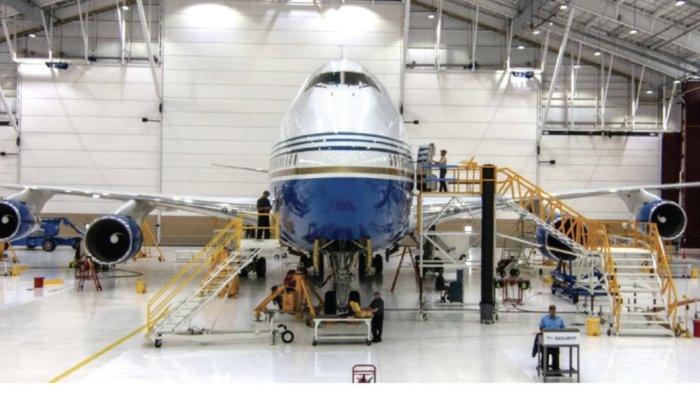AirQuest Aviation is a fixed-base operation 20 miles northeast of Pittsburgh in Butler County, Pa. It offers charter, FAR Part 61 flight training, aircraft management services and Part 145 maintenance, repair and overhaul for piston singles through midsize jets.
Mike Bechtold, AirQuest’s president and general manager, told AIN, “Butler County Airport was established in 1929 and has served the fast-growing Western Pennsylvania region well. Our location is one of our strengths as we are close to both downtown Pittsburgh as well as the rapidly growing Northern Allegheny County and Southern Butler County areas. We are in the heart of the Marcellus Shale gas play as well.”
Butler County Airport’s 4,801-foot Runway 08/26 has ILS, VOR and GPS/Rnav approaches.
“We’re working with the airport authority to lengthen the runway because it is too short for a lot of aircraft. The project is now in the engineering and environmental planning stages and we’re hoping for a longer runway to open in about 2017,” Bechtold said.
AirQuest’s facility, previously known as Butler Air, was purchased in August 2004. The new owner took over the existing FBO and maintenance service at Butler County Airport and renamed the company AirQuest Aviation.
“We had a business relationship with the owner of AirQuest and kept our own company aircraft at the facility. By 2009 our principal had a controlling interest in AirQuest so he acquired the minority interest, kept the name and began to build the business,” he said.
Bechtold had been working for the current owner for some time managing various operating businesses when he was asked to take the top spot at AirQuest. “My expertise is in business management. My aviation experience is boots on the ground rather than formal training,” he said.
The MRO pursued Cirrus and Diamond Aircraft as new lines of business and became authorized service centers and dealers for both. In 2009 AirQuest added a new 22,000-sq-ft maintenance hangar. Currently the AirQuest Aviation facility consists of three buildings. The 15,000-sq-ft operations hangar and main passenger arrival lounge was renovated in 2009. There is a 10,000-sq-ft storage hangar and the new 22,000-sq-ft maintenance hangar, which also includes office and support shops.
AirQuest maintenance service technicians receive training for the King Airs, Citations and Hawker 400. The facility is a certified Cirrus service center for all models and offers CAPS (parachute recovery system) overhaul. The company is a certified Diamond service center for the DA-20 and DA-40, and has experience on a variety of piston singles and twins. It is also an Iceshield brand de-ice boot service center, and personnel are Garmin Perspective and G1000 factory line maintenance trained. The MRO also works on the P&WC PT6 and JT15, Williams turbofans and most piston engines.
“We have had a long relationship with Specialty Turbine Service [STS]. They use our facilities regularly and have access to our shop. We have an STS PT6 and JT15 engine specialist focused on specialized assistance during engine overhauls. In addition, co-located at our facility is Prime Turbine Service, an independent PT6 overhaul specialist.
“One of our strong points is that we offer the capabilities and amenities of a large shop with all the comfort of working with a small, dedicated group of people you know by name. Our focus is on customer service and we will not be happy until you are completely satisfied with your experience,” Bechtold said. “Communication throughout the process is important to a great maintenance experience and we emphasize maintaining a running dialogue with every customer, ensuring they are in the loop the entire time.”
An Online Eye on the Project
AirQuest customers can visually track the progress of the aircraft’s maintenance event through a dedicated website. Traditionally, a customer takes up residence at the facility throughout the maintenance event. MROs commonly provide customer offices so they can work while they wait and AirQuest is no exception; however, the MRO has built a better mousetrap.
“We provide a first-class experience, but we’re geographically a little bit out of the way so we have to make it up with customer service. For example, operators want to stay involved and be informed but they have better things to do than babysit their aircraft. We use technology to keep them informed without them actually having to stay here. We provide offices for our customers’ use, but what we’ve found is once they know us they drop off the aircraft and let us use technology to keep them in the loop. Our MyMX provides access to their aircraft via video on the Internet,” Bechtold said.
Through AirQuest’s MyMX, technicians are able to upload photos of the work being done to a secure site, available 24 hours a day anywhere the customer has Internet access. Specific sessions can be set up online between the customer and the technical staff to explain issues that arise during the course of the maintenance.
“[MyMX] isn’t something we use for an oil change, but when there’s a maintenance project that a customer really does want to monitor, it’s a very useful tool. AirQuest MyMX allows the customer to go home with the knowledge that if something comes up we’ll be able to show it to him via the Internet. This further aids in understanding and communication as the process unfolds. For example, if you have an issue with fan blades we can bring them to you via the Internet rather than force you to travel to us or stay with us during the entire maintenance event,” Bechtold said. AirQuest will ferry the aircraft’s crew back to base in one of its Cirrus aircraft.
AirQuest employs 31 full-time people, including six A&P technicians and a parts and inventory manager. The operation is open Monday through Friday from 8 a.m. to 5 p.m. and has technicians on call 24/7.







